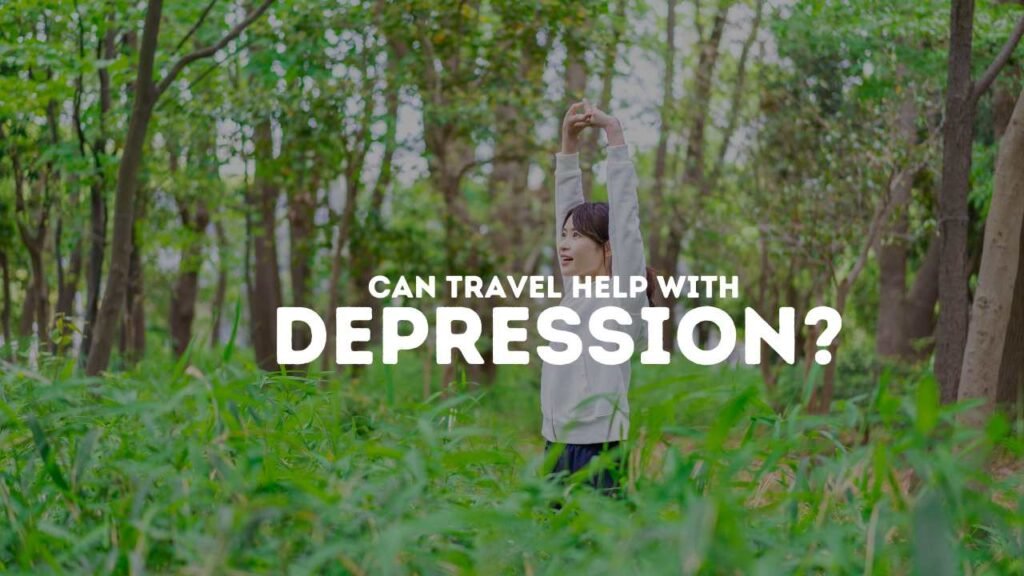Can Travel Help With Depression? Maximum time we think this question in our mind. Always remember that Travel can offer a change of scenery and routine, which may alleviate symptoms of depression. Engaging in new experiences while traveling can boost mood and perspective.
Traveling encourages new experiences and often leads to a break from the usual stressors and environments that contribute to depression. Stepping away from the daily grind, individuals find themselves immersed in different cultures, meeting new people, and taking part in unique activities, all of which can rejuvenate the mind and spirit.
This fresh setting can also provide the mental space for self-reflection, allowing individuals to reconnect with their interests and goals.
By offering a sense of adventure and discovery, travel can contribute to a sense of accomplishment and self-efficacy, potentially leading to improved mental health. It’s essential, though, to approach travel with a mindset open to healing and growth, as the change of pace alone can’t guarantee relief from depressive symptoms.
Table of Contents
Toggle- Introduction To The Interplay Between Travel And Mental Health
- The Psychology Of Travel: A Potential Remedy For The Mind
- Evidence-based Insights: What Research Says About Travel And Depression
- Cultural Exchange And Social Interaction: Building Connections And Empathy
- Nature’s Healing Power: The Impact Of Ecotherapy On Depression
- Overcoming Challenges And Building Resilience Through Travel
- Mindfulness And Meditation: Spiritual Growth During Journeys
- Tailoring Travels To Treat Depression: Choosing The Right Type Of Trip
- Limitations And Considerations: When Travel Might Not Be The Answer
- Preparing For A Therapeutic Travel Experience
- Integrating Lessons Learned And Maintaining Well-being Post-travel
- Frequently Asked Questions On Can Travel Help With Depression
- Conclusion
Introduction To The Interplay Between Travel And Mental Health

Our minds and bodies are in a constant dance of interaction. Mental health plays a pivotal role in our daily experiences. Travel emerges as a powerful character in this dance. It steps in with a promise, a whisper of relief, and the potential for change. Let’s uncover how travel might sway the rhythms of our mental wellness, particularly in individuals battling depression.
Understanding Depression: Definition And Impact On Daily Life
Depression is more than feeling sad. It is a common but serious mood disorder. It deeply affects how we feel, think, and handle daily activities. Recognizing depression is the first step to healing. This disorder can grip anyone’s life, forcing them into a shadow filled with overwhelming emotions. Key aspects it impacts include:
- Energy levels: Feeling constantly tired or drained
- Sleep patterns: Struggling with sleep, whether too much or too little
- Enjoyment: Loss of interest in activities once loved
- Self-esteem: Feeling worthless or guilty without cause
- Concentration: Difficulty focusing or making decisions
Exploring Travel As A Therapeutic Tool For Mental Wellness
Imagine breaking away from the shackles of routine. Travel holds this potential. It provides a scenic canvas for the mind to paint a fresh perspective. Through the lens of travel, the world offers various therapeutic benefits:
| Travel Benefit | Impact on Mental Health |
|---|---|
| New Experiences | Encourages positivity and cognitive flexibility |
| Natural Beauty | Stimulates tranquility and stress reduction |
| Social Interaction | Builds connections and reduces feelings of isolation |
| Physical Activity | Boosts mood through the release of endorphins |
| Change in Routine | Offers a refreshing break from the daily grind |
Travel carries the power to rejuvenate the spirit. It immerses us in different cultures, foods, and landscapes. Each journey can sow seeds of healing and represent a step towards regaining control over mental health.
The Psychology Of Travel: A Potential Remedy For The Mind

Travel isn’t just about seeing new places. It’s about healing too. It can help our minds in big ways. When we pack our bags and leave home, we might also leave behind sad feelings. That’s because travel can be like medicine for our brain.
Travel As A Form Of Escapism: Temporary Relief From Daily Stressors
Travel offers a break from normal life. Think of it like hitting pause on the hard stuff. When we escape, we let our mind rest. We’re like a phone that needs charging. New places and people give us a chance to recharge.
- Gives time for rest and recovery
- Breaks routine and daily worries
- Helps find joy in little things again
- Provides space to think and breathe
New Experiences And Neuroplasticity: How Novelty Can Boost Mental Health
New stuff is good for your brain. Our brains love learning. When we try new things, our brain makes new paths. These paths keep our mind strong and happy. It’s like giving your brain a fun workout!
| Activity | Brain Benefit |
|---|---|
| Trying local foods | Makes new taste memories |
| Learning a new language | Builds new language paths |
| Exploring a city | Teaches navigation and history |
| Meeting new people | Grows social skills |
Next time you travel, remember: it’s not just fun. It’s also good for your heart and brain. Pack your bags and let’s go make some happy brain waves!
Evidence-based Insights: What Research Says About Travel And Depression
Delving into the realm of mental health, we turn our attention to the relationship between travel and depression. Researchers continuously explore this connection in search of evidence-based insights. These studies aim to discern whether trading familiar surroundings for new horizons can impact mental well-being.
Clinical Studies On Travel’s Effects On Depression
Empirical data illuminates our understanding of this relationship. Here’s what the numbers reveal:
- Decreased depressive symptoms post-travel
- Enhanced mood and self-esteem
- Reduced stress leading to improved mental health
Structured settings in some studies simulate travel experiences. Participants exhibit notable mood improvements. Controlled environments ensure that findings solely reflect the impact of travel.
Long-term effects are crucial in ongoing research. Studies aim to measure how travel influences depression over time. Initial results suggest lasting benefits, prompting further investigation.
Personal Testimonies And Case Studies Highlighting Recovery Journeys
Real-life accounts offer powerful narratives about travel’s positive effects on depression.
| Individual | Travel Experience | Impact on Depression |
|---|---|---|
| Case A | Solo backpacking trip | Significant mood lift |
| Case B | Group cultural tour | Enhanced social connections |
| Case C | Therapeutic nature retreat | Sustained feeling of peace |
Such stories complement clinical data, showcasing individual experiences. They echo scientific findings and demonstrate the wide-ranging impact of travel on mental health.
Anecdotal evidence carries a significant weight. Testimonies continuously inspire others considering travel as part of their healing journey.
Cultural Exchange And Social Interaction: Building Connections And Empathy
Cultural Exchange and Social Interaction: Building Connections and Empathy are vital parts of travel that can offer unique benefits for mental well-being, especially for those facing depression. This explorative aspect of travel promotes an understanding and appreciation for different perspectives and lifestyles. It can help build resilience, enhance interpersonal skills, and offer a sense of belonging.
The Role Of Social Bonds In Easing Depressive Symptoms
Building new friendships during travel can provide a powerful sense of support. Social bonds have a profound impact on emotional health. They counter feelings of isolation, a common aspect of depression. Engaging with others in different environments encourages positive interactions that can strengthen mental health.
- Sharing experiences with locals and fellow travelers
- Partaking in group activities or guided tours
- Creating lasting connections with diverse groups of people
Such social interactions can lead to a release of endorphins. These are chemicals in the brain that promote a sense of happiness and well-being. Engaging consistently in social activities while traveling can forge a support network that persists long after the journey ends.
Learning Through Different Cultures To Gain Perspective And Purpose
Immersing oneself in a new culture through travel offers a valuable opportunity for personal growth. Exposure to diverse cultural practices and philosophies can help reframe personal challenges. It boosts understanding and empathy. This expanded worldview can provide fresh insights into one’s life, instilling a renewed sense of purpose.
- Experiencing varied ways of life
- Understanding the histories and stories of different peoples
- Observing the resilience of others in different circumstances
These experiences not only broaden the mind but also have the potential to inspire and motivate. Such cultural engagement can ignite a newfound passion or interest, offering clear-minded goals upon returning home. This understanding of the broader human experience can instill hope and motivation, acting as a stepping stone to overcoming depressive feelings.
Nature’s Healing Power: The Impact Of Ecotherapy On Depression
Ecotherapy unlocks a world of benefits for those battling depression.
This approach integrates outdoor activities and the environment
in the healing process. The sights, sounds, and textures of nature can work wonders on the mind.
Combating Depression With Green Spaces And Outdoor Activities
Green spaces provide a respite from urban life.
They offer a tranquil atmosphere that fosters relaxation and calmness.
Outdoor activities, such as hiking or gardening, encourage engagement with these healing surroundings.
- Walking through a park can reduce stress levels.
- Gardening connects you with the cycle of life.
- Group nature activities can lead to improved social connections.
The Psychological Benefits Of Sunlight, Fresh Air, And Physical Movement
Sunlight delivers Vitamin D, essential for mood regulation.
Fresh air can improve brain function and focus.
Physical movement releases endorphins, combatting the symptoms of depression.
| Element | Benefit |
|---|---|
| Sunlight | Boosts Vitamin D, improves mood |
| Fresh Air | Increases oxygen intake, enhances cognition |
| Physical Movement | Stimulates endorphin production, reduces stress |
Remember: A daily dose of nature can serve as a powerful ally in the fight against depression.
Overcoming Challenges And Building Resilience Through Travel
Travel is not just about seeing new places. It is about growing as a person. Facing unknown challenges during travel can help fight depression. It teaches us about our strengths. Each journey brings its own set of challenges. Overcoming these helps build resilience.
Developing Coping Strategies And Self-reliance
Travel pushes us out of comfort zones. We face new situations every day. This makes us develop new ways to cope. For example, missing a bus in a foreign country teaches problem-solving. Travelers learn to depend on themselves to find solutions. These skills also help with daily life.
- Solving problems boosts confidence
- Self-reliance translates to daily living
- New situations foster adaptability
Tales Of Overcoming Travel Hardships That Parallel Life’s Struggles
Travel stories often include overcoming hardships. They show the resilience of human spirits. These stories can be inspiring for those battling depression.
| Travel Hardship | Life Lesson |
|---|---|
| Lost Luggage | Patience and letting go of material attachment |
| Language Barrier | Importance of communication and gestures |
| Unexpected Weather | Adaptability and preparedness |
In each story of hardship, there’s a valuable lesson. Such experiences make us more resilient. They teach us life is unpredictable but manageable.
Mindfulness And Meditation: Spiritual Growth During Journeys

Travel isn’t just about seeing new places. It’s also about finding peace within. Many people find solace on the road, with the journey itself becoming a form of therapy. Mindfulness and meditation offer paths to spiritual growth during travels, encouraging better mental health.
Incorporating Mindful Practices Into Travel For Mental Clarity
Bringing mindfulness on the go can transform travel into a more meaningful experience. It’s about being present in the moment. Here’s how:
- Start each day with intention. Settle in a quiet spot. Take deep breaths. Focus.
- Notice small details around you. It could be the texture of ancient stones or the scent of street food.
- Travel slowly. Rushing leads to stress. Savor each step.
- Journal your thoughts. This helps process experiences. Keep a mini diary handy.
Exploring Destinations That Enhance Spiritual Well-being
Consider visiting places that promote inner peace. Some spots around the world are known for their spiritual significance.
| Destination | Activity | Benefit |
|---|---|---|
| Bali, Indonesia | Yoga retreats | Connects body and mind |
| Sedona, USA | Energy vortexes | Boosts spiritual awakening |
| Rishikesh, India | Meditation sessions | Enhances mental clarity |
Dive deep into these experiences. Leave feeling renewed. The spirit grows through such mindful journeys.
Tailoring Travels To Treat Depression: Choosing The Right Type Of Trip
Travel has a unique power to refresh the mind and soul. Yet, for individuals battling depression, not all travel is equal. Selecting a trip that aligns with personal emotional needs is critical. The right journey can serve as a therapeutic escape, helping to alleviate the weight of depression.
Identifying Destinations That Best Cater To One’s Emotional Needs
Finding the perfect place is more than choosing a spot on the map. Consider destinations known for their peaceful scenery or uplifting activities. For some, a quiet mountain retreat might provide a much-needed sense of solitude and reflection. Others may find solace in cities bustling with cultural experiences that shift focus outward, sparking joy and interest.
- Seaside towns: Offer a calming presence with water sound.
- Cultural hubs: Stimulate the mind with arts and history.
- Nature escapes: Promote calm and connection with the earth.
Structured Retreats Vs. Spontaneous Adventures: What Works Better For Depression?
Each person’s battle with depression is unique, affecting the choice between structured and spontaneous trips. Structured retreats provide a safe, predictable environment, often with activities designed to promote healing and mental well-being.
In contrast, spontaneous adventures might ignite a sense of freedom and excitement that is sometimes lost in the throes of depression.
| Structured Retreats | Spontaneous Adventures |
|---|---|
| Yoga and meditation sessions | Unplanned exploration of a new city |
| Timetabled therapy sessions | Impromptu beachside activities |
| Guided nature walks | Sudden road trips to unknown destinations |
It’s essential to reflect on what works personally when managing symptoms of depression. For some, the predictability of a structured retreat might be gratifying, while for others, the excitement of a spontaneous adventure could be more therapeutic.
Limitations And Considerations: When Travel Might Not Be The Answer
While exploring new horizons can be a breath of fresh air for some, traveling is not always a remedy for depression.
Recognizing The Signs When Travel Could Exacerbate Symptoms
Depression is complex. Sometimes, change in location adds stress, not relief. Signs include:
- Overwhelm by planning
- Feeling isolated in new places
- Anxiety about schedules
- Difficulty managing daily routines
Travel stirs emotions. It’s vital to recognize individual triggers before setting off.
Balancing Travel With Professional Treatment And Therapy
Integration of travel and ongoing treatment is essential.
| Before Travel | During Travel | After Travel |
| Consult with a therapist | Maintain medication routines | Debrief with a professional |
| Plan for support access | Use coping strategies | Assess mental state changes |
Effective travel with depression involves careful coordination with mental health providers.
Preparing For A Therapeutic Travel Experience
Depression often dims life’s vibrancy, but travel can reignite joy and wonder. A new environment stimulates the senses, offering a reprieve from the daily routine that may contribute to depression. Planning a trip with a focus on mental health can enhance the healing journey. Intentional travel planning and packing smartly create a nurturing space, even while on the move. Let’s explore how to prepare for a trip that soothes the mind and uplifts the spirit.
Planning And Setting Intentions For Mental Health Benefits
Begin by mapping out your journey with mental well-being at the forefront. Set intentions that promote peace and recovery. Consider these planning steps:
- Choose a serene destination that calms the mind.
- Research activities that foster relaxation and self-reflection.
- Book accommodations that provide a safe, comforting haven.
- Outline a flexible itinerary that allows for rest and spontaneity.
Intentions might include journaling daily, meditating in nature, or seeking out quiet spaces. Balance is key; plan for both adventure and downtime.
Packing Tips And Strategies To Maintain A Comforting Environment While Traveling
Packing can make or break the tranquility of your trip. It’s not just about clothes; it’s creating comfort in a suitcase. Here are some strategies:
- Make a list of items that foster comfort and calm, like a favorite book or a soft blanket.
- Limit luggage to essentials to reduce stress and physical burden.
- Pack versatile clothing for various weather conditions.
- Include familiar scents or music to soothe.
- Never forget medications or wellness items crucial to your mental health.
Remember, organizing your bag can keep anxiety at bay. A tidy suitcase means a tidy mind. Engage in practices that maintain stability and serenity, every step of your journey.
Integrating Lessons Learned And Maintaining Well-being Post-travel
Exploring new places can brighten our moods and expand our horizons. But what happens after the suitcases are unpacked, and daily routines resume? Let’s explore how the joy and peace from our travels can stick around, even back at home.
Transitioning Back To Regular Life After Travel
Returning home from a fulfilling journey can feel abrupt. You might miss the freedom or the new friends. It’s normal to feel a bit down as you adjust. But, the key is to reframe your mindset. Consider your daily life as an extension of your travels. By doing this, you allow the joy of discovery to continue.
- Stick to routines from your trip that made you happy.
- Plan mini-adventures in your own city.
- Reflect on your experiences and how they changed you.
- Create a travel wall with photos and souvenirs.
Continuing Practices And Habits Acquired During Travel For Lasting Impact
Travel often introduces us to new ways of living. Maybe you found joy in simple living or you loved starting the day with a walk. Bring these habits home. They can become tools to maintain mental wellness.
| Habit | How to Continue at Home |
|---|---|
| Morning walks | Choose a local park or street to recreate this routine. |
| Trying new foods | Experiment with recipes or visit local international eateries. |
| Digital detox | Set aside time each day to disconnect from screens. |
| Journaling | Keep writing about daily life and self-reflection. |
Maintaining these small yet significant practices can have a profound effect on your well-being. They remind us of the joy found in travel and help us cope with daily stresses. Start integrating these changes today for a happier, healthier life.
Frequently Asked Questions On Can Travel Help With Depression
Can Travelling Improve Mental Health?
Yes, traveling can improve mental health by reducing stress and anxiety, enhancing creativity, and boosting happiness and self-esteem.
Does Vacation Improve Mental Health?
Yes, vacations can improve mental health by reducing stress, enhancing mood, and providing a much-needed break from daily routines. They promote relaxation and can lead to increased happiness and life satisfaction.
Does Travel Boost Mental Health?
Travel can improve mental health by providing new experiences, a break from routines, and exposure to different cultures. These elements combined can contribute to reduced stress levels and a refreshed mindset.
Can Travel Alleviate Symptoms Of Depression?
Yes, travel has the potential to alleviate depression symptoms. It encourages physical activity, social interaction, and the engagement of the senses, which can all positively impact mood and well-being.
Conclusion
Embarking on a journey can be a step toward healing. Fresh scenery and new experiences often rejuvenate the spirit. Travel isn’t a universal cure, but it offers a respite for many battling depression. Seeking professional advice alongside adventures is key.
May your travels lead to brighter days.



